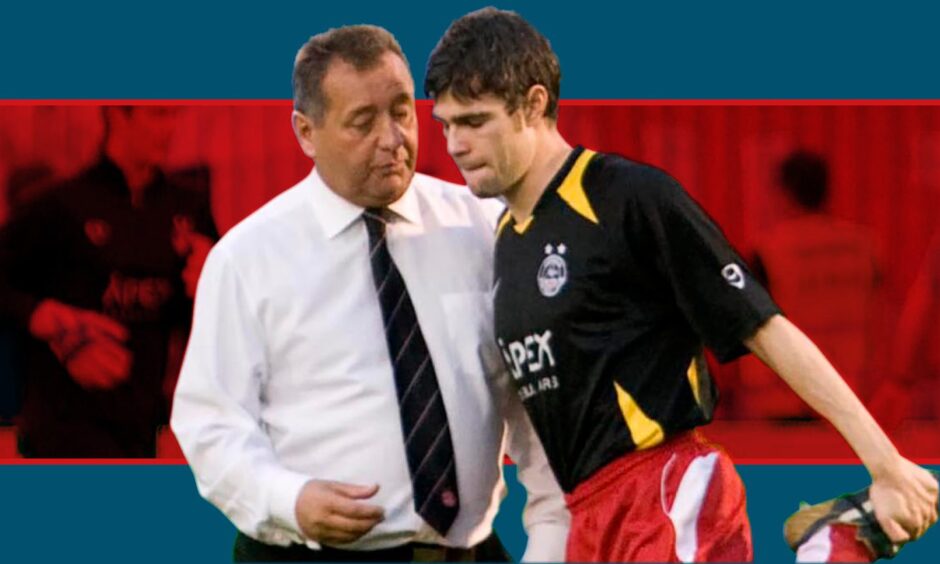
Former Aberdeen defender Michael Hart knows the “very difficult” situation faced by the family of dementia-stricken ex-Dons manager Jimmy Calderwood – as his own father is also suffering with the disease.
Speaking to The Press and Journal for the final instalment of our series marking 20 years since Calderwood took charge at Pittodrie, Hart revealed the sad coincidence between his “fantastic” former gaffer and dad.
Calderwood, 69, was diagnosed with early-onset Alzheimer’s in 2015.
In 2021, his son Scott Calderwood told the Daily Record the former Reds boss’ condition had deteriorated to the point he was in hospital and no longer recognised close family members.
Two years Calderwood’s junior, Hart’s father Jim, 67, is also suffering from dementia – a mix of Alzheimer’s and frontal temporal dementia.
Calderwood’s vice-captain for a time at Aberdeen, ex-right-back Hart is all too familiar with the toll the once larger-than-life manager’s condition will be taking on loved ones.
Hart said: “Jimmy was fantastic for me and probably the best era of my playing career was under Jimmy, and I’ve got a million stories about him as well.
“I met him after he was diagnosed, and it was quite difficult to see and speak to him about certain things.
“It’s a very difficult situation for his family also – I’ve met his son a few times.
“He was a big football man, and you think: ‘If I pass him now in the street would he even recognise me?’ The answer would probably be no, given how my dad is.
“It’s a very difficult time for him and obviously he’s been suffering with it for a long time now.”
Hart’s father Jim, meanwhile, began to show signs of cognitive issues – including being unable to name everyday objects in pictures or count backwards from 10 – a year before his dementia diagnosis.
“The change has been so difficult for us as a family, but mainly my mum, Irene, who’s there day in, day out, seeing the change,” Hart said. “There are traits in the condition he’s got where he doesn’t really know what he’s doing.
“He acts like a child at times. He won’t wash, or he’ll steal.
“It’s a horrible, horrible, horrible condition, and one we are struggling to understand and cope with.
“At least with an illness like cancer, you can fight it.
“The person looking at you isn’t the person you used to know.”
Having worked in the oil industry since his retirement from football, Hart, his wife and two young children recently relocated to Abu Dhabi from Brunei.
This means it is now easier for them to travel back to see his deteriorating dad, who also has blood cancer, in Blantyre, near Glasgow.
Hart says his employer Wood have been “great” and have told him he can return to Scotland “any time” he feels the “tough” situation requires it.
Tough, too, for former right-back Hart is the knowledge his former manager Calderwood and his loved ones are going through a parallel ordeal to his own family.
Jimmy Calderwood: Boss who hated drawing; was a ‘bag of laughs’ – but serious when it came to football and fitness
As Hart says, there is no fighting or winning against dementia.
There is an irony in ex-Aberdeen boss Calderwood’s situation, as during his dugout career – including his five-year stint at Pittodrie from 2004 to 2009 – he didn’t even like to draw matches.
Former marauding full-back, Hart, now 44, said: “If it was draw with 10 minutes to go, as an Aberdeen fan you must have loved it, because the 2-4-4 came into it.”
An Aberdeen youth academy graduate who initially left the club during Ebbe Skovdahl’s tenure, Hart returned to Pittodrie from Livingston just a few months before Calderwood and assistant Jimmy Nicholl’s arrival in the summer of 2004.
The Reds were 11th under Steve Paterson in 2003-04, but new boss Calderwood took them up to fourth in his first campaign in charge.
Asked how he thinks the new manager galvanised Aberdeen so quickly, eventually leading them to the top six in all five of his seasons in charge, Hart said: “Jimmy was just a bag of laughs. He loved a laugh and a joke.
“But see when it came to getting out on the field, he was serious.
“I had a couple of screaming matches with him – but he used to get the most out of you.”
He demanded the best out of every individual and I think every individual gave him that.” Michael Hart
Hart added: “There was a process of turning up properly to work.
“Jimmy Nic was good for a laugh, but training was of a good standard.
“But as soon as Jimmy Calderwood turned up, the standard went up a notch.
“He demanded high standards – or else you knew you were getting the bark off him.
“Some of the players we had back then, we had fantastic players, and I don’t think he did anything apart from demand the best out of every individual – and I think every individual gave him that.
“You had to earn his respect and trust, and you got that back.”
One of the ways Calderwood wrung every ounce of potential out of his squad was making sure he had “athletes”, Hart explained, with “horrific” pre-seasons.
Hart added: “For the whole close season, you were so scared of what you were going back to.
“The running was so tough you didn’t take a proper break, you ended up just going: ‘I’ll take a week off, and then I’ll get going, because if I let my fitness slide, I won’t be able to handle it.'”
Calderwood’s methods to draw squad together
The close bond between manager and squad, according to Hart, was also a huge part of the upturn in the Dons’ fortunes under Calderwood.
For example, at the end of each season, the Aberdeen players would meet Calderwood in Magaluf, where he had a house, for beers.
Even during the season, off the field, there were pranks – including cups of juice precariously positioned above the dressing room door awaiting the manager’s arrival, shoes nailed to the floor, and scarecrows made from players’ clothes in the middle of the Pittodrie pitch.
Describing Calderwood’s ability to bring his team together and ensure they stayed together – when winning and losing – Hart said: “Jimmy was amazing for ‘win or lose, on the booze’ – but it wasn’t that people were forced into drinking. It was an option if you won.
“But he wanted everybody together in the players’ lounge after the game.
“We did a Friday competition every week, then you went back and losing team had a vote for the worst player in the team.
“If you were voted the worst player on the Friday, you had to bring beers for the players’ lounge for after the game on a Saturday.”
Hart added: “If you lost a game, you’d never be drinking – you’d be licking your wounds.
“But if there was a time where he thought: ‘There’s a wee dip in form here or something, I need to intervene’, he’d always do a day out – a Tuesday out at La Lombarda or whatever it used to be.
“We’d shut the doors, go for a bite to eat and he’d give you a couple of beers.
“And the truth used to come out once you’ve got a drink in you. He’d go: ‘Right guys, we’ve obviously gone through two games beaten and we’re struggling a wee bit or I’m seeing you’re a bit lax or you’re arguing – what’s going on?’
“Then we’d go home and come in on the Thursday, going: ‘Right that problem happened, last Saturday is not there anymore, we’re a team and we’re back on it.’
“He was really good at drawing everybody together.”
Calderwood put faith in Hart at Panathinaikos
Calderwood’s fourth season at Aberdeen, 2006-07, brought a famous Uefa Cup adventure – sparked by finishing third the previous campaign.
Hart pointed to the opening group clash at Panathinaikos – which ended in a 3-0 defeat – as an example of why he personally “loved” playing under Calderwood, and the faith and trust shared boss and player.
Hart said: “I always knew every time if I was fit under Jimmy I would play. He had that much respect for my playing style and stuff that I just had to say to him I was fit and he would play me.
“With niggling injuries I tended to miss a lot of the week and just turn up on a Thursday or a Friday, and he’d go: ‘Right, you’re playing’.
“Two weeks before Panathinaikos, I’d been booked in to get my tonsils out, because I’d been struggling with it for a period of time.
“He knew I’d miss the next Saturday, but I’d be comfortable enough for the European game.
“But I ended up getting an infection and in the hospital for two days – I’d lost 11lbs or maybe a stone in weight.
“I was never going to be fit for the game (in Greece), because it took me right up to the day before the boys travelled out – I hadn’t even ran for the two weeks before!
“He said to me: ‘Listen, we want you to travel. You’re a big part of the team, you’ve got a lot of respect from the boys and you’ve helped us get here.’
“I still wasn’t feeling great, and when I look back at photos I was white as a ghost.
“So, anyway, I travelled. The day before the game, Sharpy (John Sharp), the physio, told me: ‘The boys are doing their training session, do you fancy doing a wee bit?’
“I said: ‘I’ll do a couple of runs on the pitch, that’ll be great.’
“So I went out on the pitch, did my run, and then Jimmy came in to me the next day, and told me he wanted to play me!
“Sharpy almost had a heart attack, but I said: ‘Absolutely’.
“It was quite obvious when we went one down, then two down quite early on that it was a mistake – but I would never have said no!”
‘He 100% should have went on a bigger job than he did’
Having also started both Uefa Cup qualifying round games against Dnipro, Hart went on to play in the next group game at star-studded Atletico Madrid (fouling Sergio Aguero for a penalty in a 2-0 loss), as well as the 1-1 draw with Lokomotiv Moscow and the 4-0 hammering of Copenhagen at Pittodrie.
“The most memorable night of my career,” Hart says, when describing the night against Copenhagen.
The result meant Calderwood’s Dons made it through to a two-legged last-32 clash with German giants Bayern Munich, which they lost 7-3 on aggregate after a phenomenal 2-2 draw in the Granite City.
However, mainstay Hart – who had torn a hip flexor anyway – left the club before the Bayern tie to join Preston North End, having failed to agree a new contract with then-Reds director of football Willie Miller, specifically due to frustrations over his salary relative to other players at the club.
Calderwood was then axed by Pittodrie chiefs a year-and-a-half later, at the end of the 2008-2009 season, replaced by Mark McGhee despite finishing fourth in another solid top-six campaign.
The boss would go on to manage Kilmarnock and Ross County for short spells in Scotland, before returning to the Netherlands, where he had previously played and managed, to take charge at Go Ahead Eagles and De Graafschap for similarly brief stints, his dugout career ending in 2014.
Hart thinks Calderwood “didn’t get the jobs he deserved” after overseeing a five-year period of stability at the Dons, and said: “He 100% should have went on a bigger job than he did.
“It would’ve been interesting to see him at an English Championship club or something to see how he did.”
Read the rest of our series on former Aberdeen FC manager Jimmy Calderwood:
- Jimmy Calderwood 20 years on: Russell Anderson on the man who breathed fresh life into Aberdeen
- Jimmy Calderwood 20 years on: Darren Mackie believes ex-Aberdeen boss saved his Pittodrie career
- Jimmy Calderwood 20 years on: Richie Byrne reveals boss’ efforts to help him see his son during Dons spell
- How Willie Miller and Jimmy Calderwood went from team-mates to work colleagues at Aberdeen
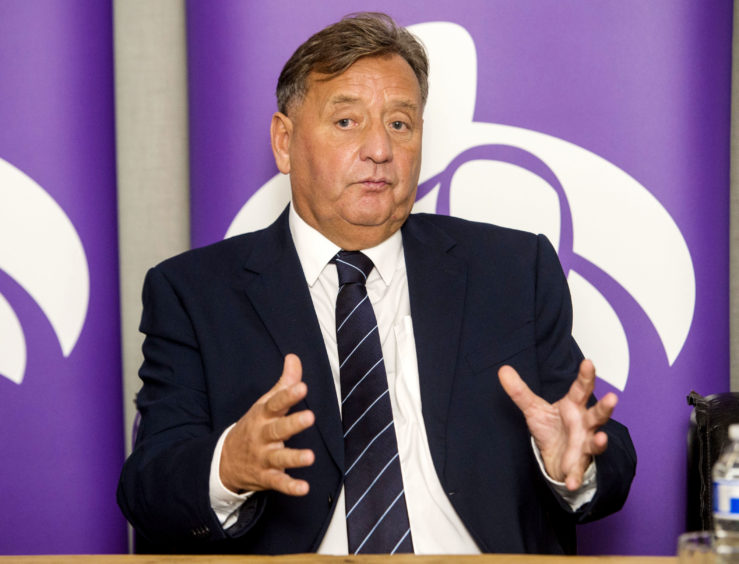
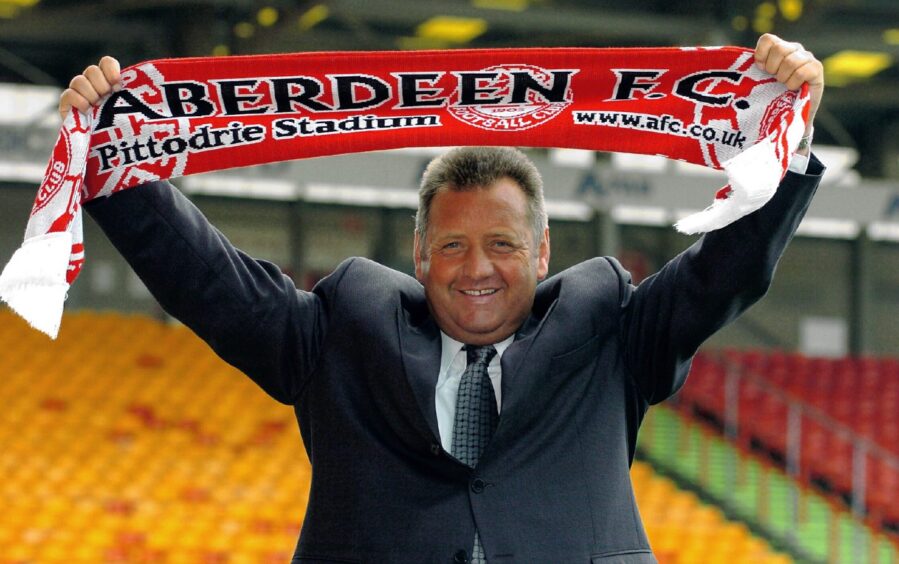
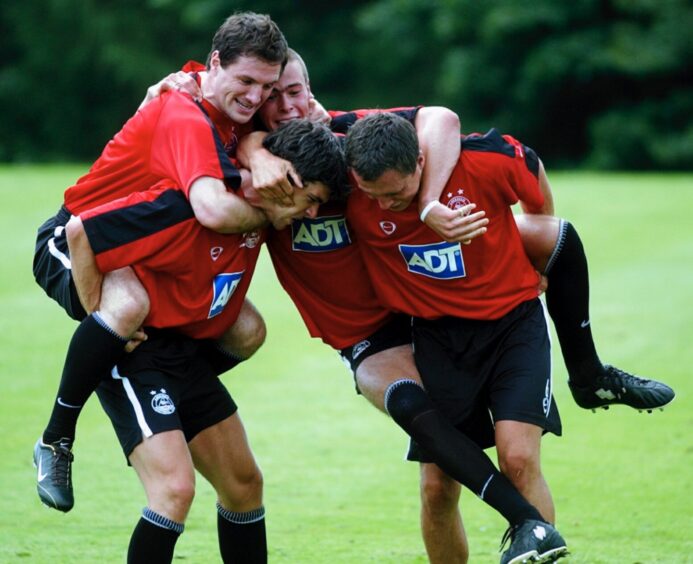
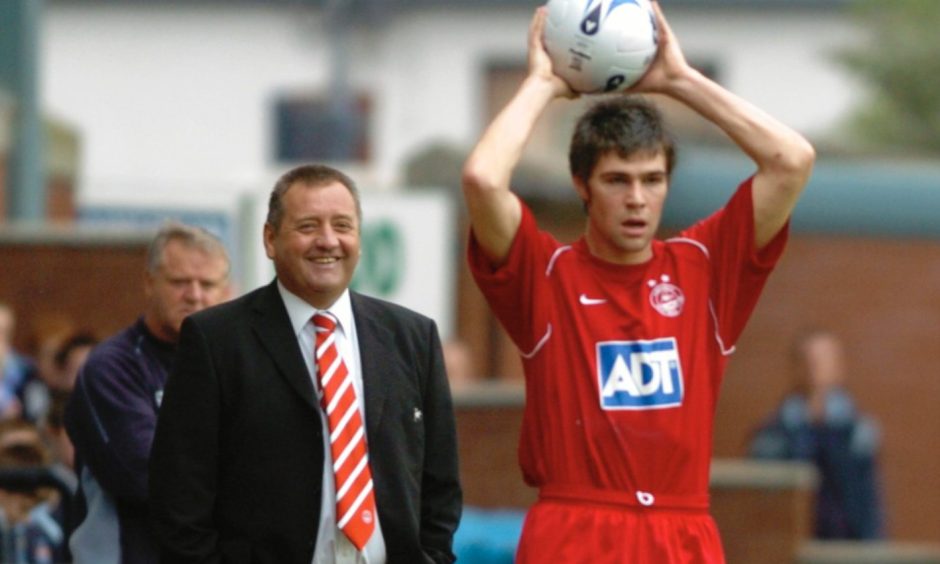
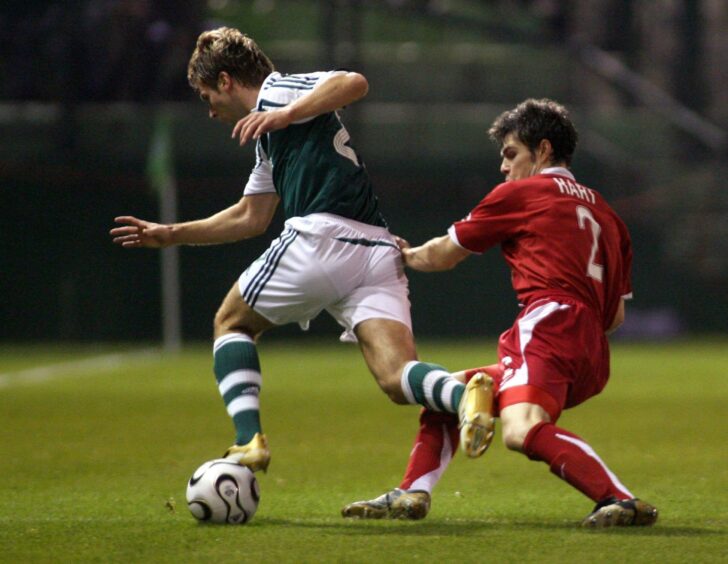
Conversation